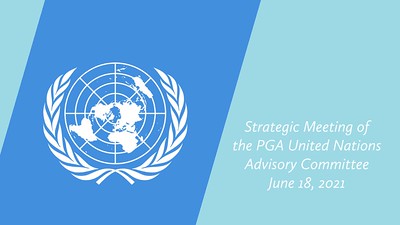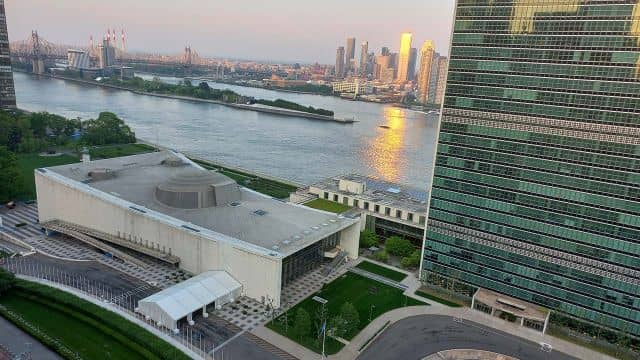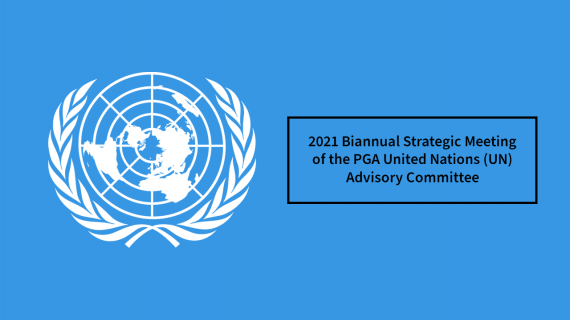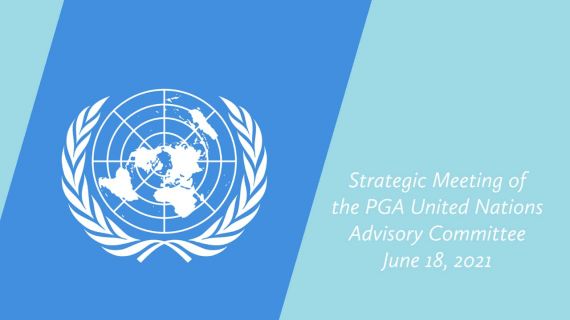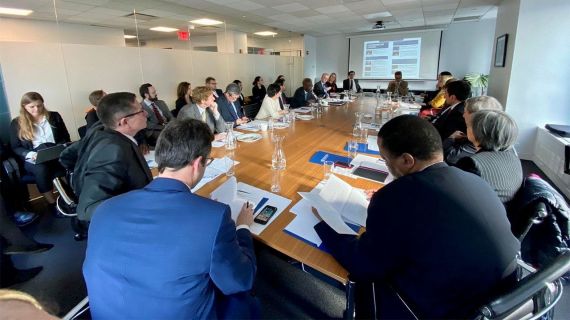On 18 June 2021, PGA Board members participated in the PGA United Nations (UN) Strategic Advisory Committee Meeting, hosted by the Permanent Mission of Liechtenstein to the UN, to discuss the role of Parliamentarians in supporting and implementing the UN agenda at the national level.
In his welcoming remarks, Ambassador Christian Wenaweser (Liechtenstein), Chairperson of the UN Advisory Committee, reiterated the importance of legislators to ensure that the priorities of the UN become a reality through their implementation at the domestic level. PGA Board Member, Mr. Naveed Qamar, MP (Pakistan), emphasized that the organization’s treaty campaigns have benefited from Liechtenstein support and partnership through the years which brought some positive results in many regions.
In the first panel dedicated to Our Common Agenda, the upcoming report that the UN Secretary-General will deliver to the UN General Assembly in September 2021, Dr. Volker Türk, Assistant Secretary-General for Strategic Cooperation in the Executive Office of the United Nations Secretary-General, made several observations linked to the current context. The interconnectedness of countries in the world prevents any one country from tackling global issues on its own. The Covid-19 pandemic revealed a shared vulnerability across the world – global north and global south alike. Through history, crises have brought about new momentum for increased international cooperation, which is currently much needed including on the availability of vaccines. The UN 75 Declaration brought all UN Member States together to recommit to different principles such as leaving no one behind, complying with human rights standards and committing to take action to attain the Sustainable Development Goals. Our common agenda is a propitious moment to involve all relevant stakeholders including youth groups, civil society organizations, and private sector organizations to render multilateralism more effective. Parliamentarians have a pivotal role to play in international cooperation, and this is why PGA was invited to take active part in relevant consultations with the Executive Office of the Secretary-General. Additionally, to cite SG Antonio Guterrese, a “new social contract” should be formed between populations and institutions that serve them for more equality, visibility of vulnerable populations, and strategic foresight. In his presentation, Dr. Türk included legislators as fundamental actors with whom the UN should engage outside of short-term electoral cycles, to focus on a long-term view toward the implementation of the SDGs. The pandemic is an opportunity to rethink what global public goods means and what type of governance is most adequate to ensure they are available to all.
PGA Board Member, Ms. Petra Bayr (Austria), intervened in the debates to remind the audience that the Covid-19 pandemic has revealed the failures of governments, inter alia on private and public funding of vaccines and intellectual property rights. Governments are expected to strive to strike a balance between profit and public health.
PGA’s Secretary-General commented on the fact that the UN Secretary-General should feature international law on the agenda and work toward a greater and more effective implementation of the Charter: 75 years since its adoption there are multiple features of the UN Charter that remain largely unfulfilled, especially in respect of the mandate entrusted with the Security Council to maintain and restore international peace and security.
PGA Board member, Boris Dittrich (Netherlands), commented that trust in the social contract must be built and nurtured. At the international level, we are witnessing certain incongruities: for instance, UN Member States with a dire record on human rights be voted into the Human Rights Council.
PGA Board members, Mr. Naveed Qamar (Pakistan) and Ms. Kasthuri Patto (Malaysia), respectively explained that Members of Parliament (MPs) are politicians and consequently operate at the local level, with direct legitimacy originating from the peoples whom they represent. They stressed that it is important, at the international level, that human rights violators be held accountable, and this is why PGA strongly supports the ICC, and PGA Members are engaged in campaigns for the universalization of the Rome Statute and other treaties that are crucial for human rights and international peace and security.
PGA Board Member, Mr. Mark Pritchard (United Kingdom), raised the issue of the abolition of the death penalty and the role the UN can play to ensure that a greater number of countries abolish the death penalty or issue a moratorium on its use. Dr. Turk commented by reaffirming the UN Secretariat’s commitment towards abolition, in line with international instruments.
PGA Board Member, Ms. Rozaina Adam (Maldives), expressed her concerns for countries that are being left behind, without vaccines. The populations in these countries are penalized and the difference in treatment between countries from the global North and the global South is apparent.
In the second panel, dedicated to the unique role of parliamentarians in preventing atrocities, Ms. Karen Smith, Special Adviser of the UN Secretary-General on the Responsibility to Protect (R2P), emphasized that atrocity prevention cannot only be implemented through the Executive branch as it is too narrow. In 2013, the Inter-Parliamentary Union (IPU) passed a resolution on the role of MPs. There are many steps that MPs can take to support atrocity prevention. Specific recommendations include:
- Monitoring the status of ratification and implementation of international law and international human rights conventions.
- The adoption and ratification of critical instruments such as the Rome Statute or the Genocide Convention.
- The integration of atrocity prevention in draft legislation – one example is the insertion of human rights clauses in trade related laws.
- Proposing and leading annual parliamentary debates on atrocity prevention.
- The establishment of parliamentary committees dedicated to atrocity prevention.
- Holding the Executive branch of government accountable by continuously posing parliamentary questions on actions taken in the field.
- Raising questions regarding human rights institutions such as the ombudsperson and relevant information that these institutions may wish to share with Parliament.
- Conducting regular atrocity risk assessments and reporting on them with the collaboration of civil society organizations.
- The creation of national atrocity prevention strategies.
- The incorporation of Universal Periodic Review reporting.
- Denouncing the use of misinformation and disinformation.
- Raising awareness on hate speech, while striking a balance with freedom of expression.
- Ensuring the participation of women in politics.
- Drafting and implementing policies to end gender-based discriminations, as risk factors of atrocities.
- The criminalization of gender-based violence.
- Contacting MPs in other countries and regional organizations to maintain a dialogue and share best practices.
- Forging relationships with countries at risk, support them and connect them with allies in civil society and the media.
Mr. Kyle Matthews, Executive Director of the Montreal Institute for Genocide and Human Rights Studies (MIGS) explained that MPs are underutilized and that they can engage at the international level to support the UN and R2P. It is to be said that MIGS and PGA launched a parliamentary handbook on preventing violent extremism and mass atrocities in 2018 at the margins of the Milan Forum. Mr. Matthews urged parliamentarians to look at model legislation across the world and consider other instruments such as the U.S. Elie Wiesel Genocide and Atrocities Prevention Act of 2018, the power of the purse, Magnitsky-type legislation, and demand the application of the Genocide Convention to situations such as that of the Uyghur and Rohingya.
Lieutenant-General Roméo Dallaire, former Canadian Senator, distinguished Senior Fellow at MIGS, gave some recommendations. Some instances were created to tackle atrocity prevention such as the Genocide Prevention Advisory created by Kofi Annan, former UN Secretary-General. The lack of transparency between UN agencies hinders mechanisms that ensure the prediction and prevention of atrocities. The idea of the group was to advise countries – on the ground – that the situation was devolving into a genocide and present recommendations on how to prevent it. This analysis was not well received by countries who did not want such presence on their soil. Lieutenant-General Dallaire, as former parliamentarian reiterated the importance of legislators, who hold considerable decision-making prerogatives. MPs can influence parliamentary committees, their colleagues domestically and abroad, State budgets, foreign policies, and the Executive through oversight. An important suggestion is to ensure that parliaments have an atrocity prevention group capable of engaging with other parliaments and parliamentary peers. Furthermore, an early warning sign that should always be considered is the use of child soldiers. The use of children as weapons of war is one of the first signs of potential mass atrocities. PGA Board Member, Mr. Jorge Cálix (Honduras), expressed profound concern on how the government in his country is recruiting children from poor cities to enter into para-military militias, under the guise of providing them with education or a ‘future’ and being the guardians of the “patria”.
In the third panel dedicated to strengthening international law and criminal justice, Ms. Simona Popan, Head of the Legal Section of the Delegation of the European Union to the UN, presented the EU policy in support of international law and human rights. International law is the backbone of the multilateral system, and the UN is where the formalization of the norms take place. International law alone cannot deliver justice which needs the support of the international community, domestic judicial systems, and national legislatures. As States are the primary subjects of international law, they must agree to comply with the rules of international bodies tasked with the implementation of international norms. In that regard, the role of MPs is essential. Legislators must ensure accountability through various means including the adoption and implementation of pertinent laws. In doing so, MPs also support international courts to effectively carry-out their mandates, especially that of the International Criminal Court (ICC). Finally, the codification of customary international law requires the willingness of States to enforce international law.
PGA’s Secretary-General stressed the importance of the partnership that PGA and other civil society organizations had with the EU in global campaigns for the fight against impunity to counter the most serious crimes of international concern, praised the ongoing cooperation with the EU Special Representative for Human Rights Mr. Eamon Gilmore (former MP and former Minister for Foreign Affairs of Ireland) and relevant EU organs, and wished that the partnership with the European Commission could be renovated in the current 2021-27 budgetary framework.
Ambassador Wenaweser and Mr. Naveed Qamar concluded the interactive session stating that PGA Members worldwide will continue to support the priorities of the UN to fully implement the UN Charter and to achieve the SDGs, including SDG 16 on peaceful and inclusive societies for sustainable development, access to justice for all and effective, accountable, and inclusive institutions.




